OliPhenolia
A source of hydroxytyrosol and other polyphenols
from the fruit water of biodynamically cultivated olives
How OliPhenolia was created
As often occurs, “our elders” were right about things that modern times had relegated to the category of curiosities or superstitions. Nonna Caterina (1902 - 2000) – grandmother, great-grandmother and great-great-grandmother of the Lo Franco family – during the olive pressing season had the habit of drinking, a couple of times a day, half a glass of “acqua mora” (= dark water).
This expression is used here in Tuscany for the water contained in olives and olive leaves that, after pressing, is separated from the oil, which is lighter (this is done mechanically, by centrifugation). What’s more, “acqua mora” has a very bitter taste, so Nonna Caterina left everyone agape. But, resolute as always, she didn’t care...
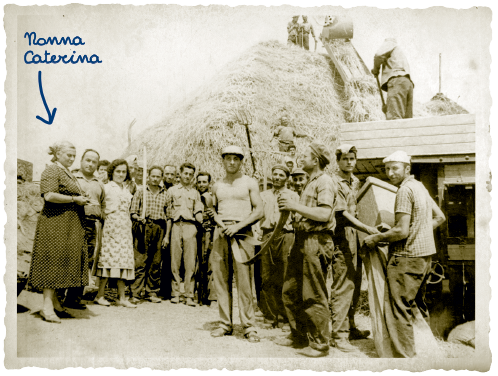 Nonna Caterina with the farmers at wheat threshing time
Nonna Caterina with the farmers at wheat threshing time
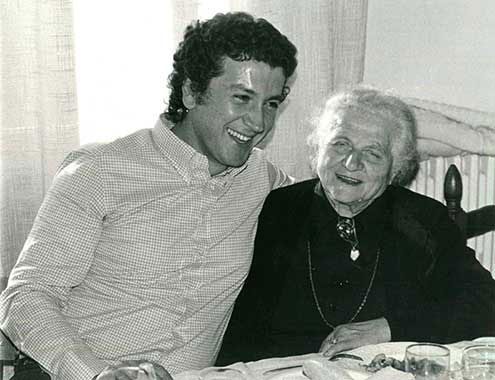 April 1980: Piero Lo Franco and Nonna Caterina
April 1980: Piero Lo Franco and Nonna Caterina
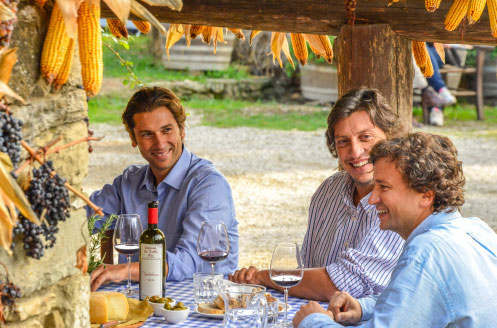 In the photo: the “Piazzetta” at La Vialla farmstead, May 2016, the three Lo Franco brothers, Bandino, Gianni and Antonio.
In the photo: the “Piazzetta” at La Vialla farmstead, May 2016, the three Lo Franco brothers, Bandino, Gianni and Antonio.
In recent years the scientific community has discovered that this water is overflowing with olive polyphenols (more than the oil itself: the proportion is 1:20!), in particular hydroxytyrosol, verbascoside, 3,4-dhpea-eda and many others, which are delicate water soluble molecules.
In 2010 at the Fattoria, thanks to the support of the Famiglia Lo Franco Foundation, a project was initiated with the aim of enhancing the numerous, valuable substances contained in this olive fruit water – it was given the name “OliPhenolia®”. For olive mills this liquid, also known as “vegetation water” is usually simply seen as wastewater, but at La Vialla it has always been used as a resource: the fruit water is added to the biodynamic compost, where it matures for 6-8 months and then returns to the ground – in the form of a fertile amendment – to complete the natural cycle. But it is much more than this. Now, finally, it can also be used as a “food” once filtered and concentrated (with a simple cold-filtering process).
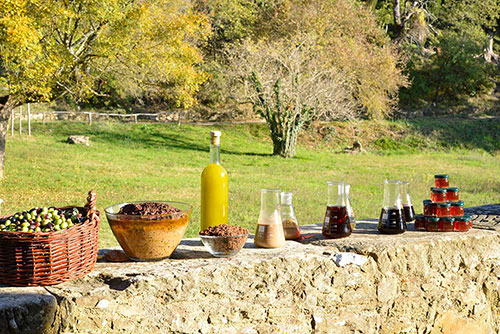 The path of the polyphenols
The path of the polyphenols
What OliPhenolia is used for and what its polyphenols do
OliPhenolia can be defined as “freshly squeezed polyphenol juice”, which is easy to use as a supplement in a well-balanced diet. As you will find out further on, one little jar of this product contains a concentrate of polyphenols: the liquid, once pressed and separated from the olive oil and pomace (a waste material), is concentrated through cold-filtering. To make a comparison, 250 mg (the average amount contained in a jar) is the quantity of polyphenols found in roughly 300 g of freshly picked olives.
Polyphenols, such as the ones in olives, constitute a family of substances of plant origin comprising over 5,000 molecules; they are produced by the secondary metabolism of plants.
How OliPhenolia is made
The climate friendly olive mill at the Fattoria
Every year, from mid-October to the beginning of December, there’s one place at the Fattoria where work never stops: the olive mill. Throughout the day (and night) the freshly picked olives arrive, to be pressed as quickly as possible, so as to preserve their flavour, aroma and... polyphenols.
After removing the majority of the leaves (but not all of them, because they also contribute to the flavour and polyphenol load) the olives are rinsed quickly and then enter the mill. Protected from oxidation thanks to the cupola filled with nitrogen (patented by Fattoria La Vialla), they are ground between granite millstones, which slowly transform them into a thick paste.
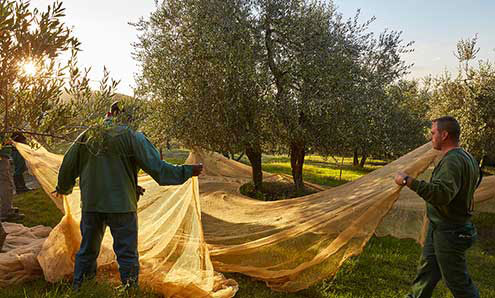 The olive harvest
The olive harvest
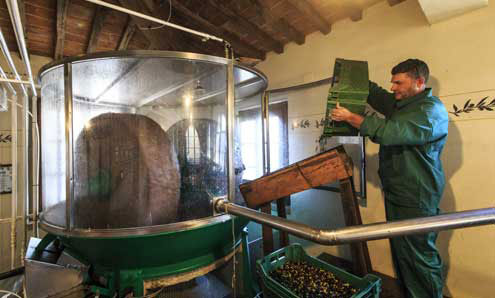 Grinding olives in the mill
Grinding olives in the mill
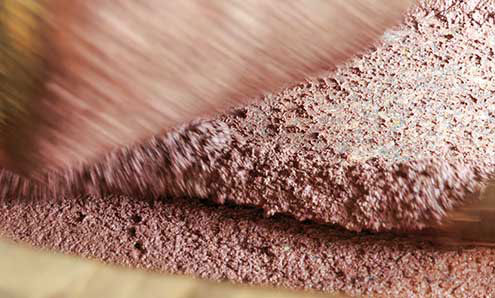 Olive paste
Olive paste
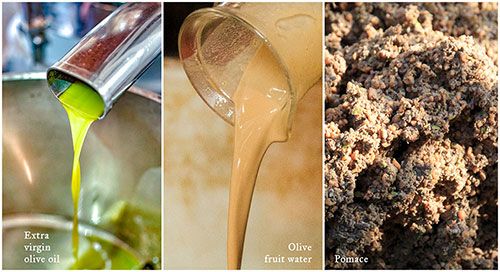 The process of crushing olives produces, on average, 14% of oil, 28% of vegetation water and, for the remaining part, pomace (woody fibres of the stones reduced to a paste)
The process of crushing olives produces, on average, 14% of oil, 28% of vegetation water and, for the remaining part, pomace (woody fibres of the stones reduced to a paste)
This olive paste (a mixture of flesh, juice, stones, leaves and oil) is then centrifuged twice. The first time separates the extra virgin olive oil from the wet pomace. This wet pomace then undergoes a second, cold centrifugation, which separates the dry pomace from the water contained in the fruit (Nonna Caterina’s “acqua mora”) which is reclaimed for reuse.
OliPhenolia is extracted by filtering and concentrating this aqueous part of the olives (the olive mill waste waters or “olive fruit water”) with the use of ceramic membrane technology and reverse osmosis; solely through mechanical cold filtering, without the use of chemical solvents or heat.
This state-of-the-art method (considered a B.A.T. or Best Available Technology) was studied and elaborated with the specific intent of preserving the integrity of the delicate polyphenolic molecules, and required more than two years of research and trials by Prof. Massimo Pizzichini (ENEA) and his team, which led to a patent being filed.
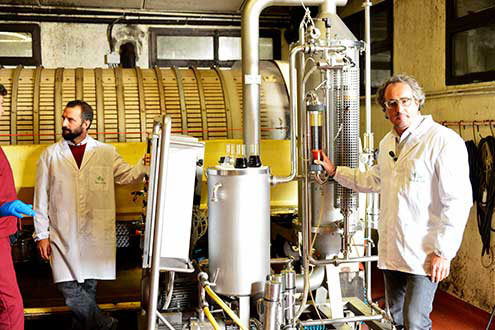 The oenologist Marco Cervellera
The oenologist Marco Cervellera
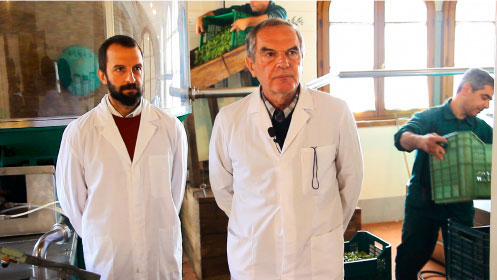 In the photo: the olives are pressed in the new olive mill. Prof. Massimo Pizzichini (on the right) with his son, Dr Daniele Pizzichini, during an inspection. They are the farm’s ENEA consultants for extraction of the polyphenols from the vegetation water. In the background, the dome that protects the pressed olives from oxidation operating under nitrogen, patented by La Vialla ( patent no. 2620219).
In the photo: the olives are pressed in the new olive mill. Prof. Massimo Pizzichini (on the right) with his son, Dr Daniele Pizzichini, during an inspection. They are the farm’s ENEA consultants for extraction of the polyphenols from the vegetation water. In the background, the dome that protects the pressed olives from oxidation operating under nitrogen, patented by La Vialla ( patent no. 2620219).
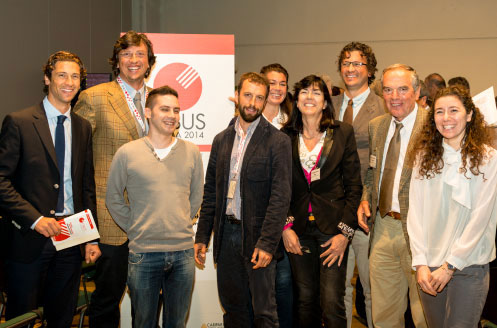 In the photo: Parma, May 6th 2014 at the presentation of the OliPhenolia Project at CIBUS, XVII International Food Fair. From the left: Bandino, Gianni, Dr Antonio Bruno, Dr Daniele Pizzichini, Silvia, Dr Adriana Albini, Antonio, Prof. Massimo Pizzichini and Dr Teresa Rossi..
In the photo: Parma, May 6th 2014 at the presentation of the OliPhenolia Project at CIBUS, XVII International Food Fair. From the left: Bandino, Gianni, Dr Antonio Bruno, Dr Daniele Pizzichini, Silvia, Dr Adriana Albini, Antonio, Prof. Massimo Pizzichini and Dr Teresa Rossi..
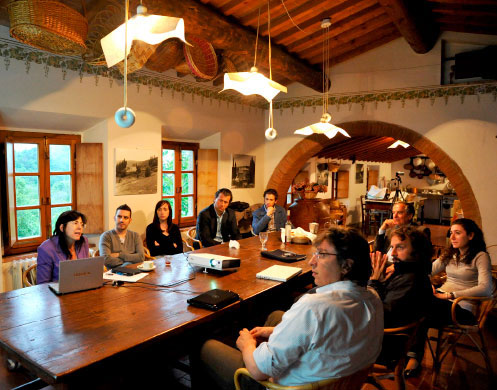 In the photo: March 2014, guest quarters of La Lignana farm, Dr Albini illustrates the progress of the research. From the left clockwise: Dr Adriana Albini, Dr Antonino Bruno and Dr Arianna Pagani (researchers), Antonio, Bandino, Prof. Massimo Pizzichini (ENEA), Dr Teresa Rossi (researcher), Dr Daniele Pizzichini (ENEA) and Gianni
In the photo: March 2014, guest quarters of La Lignana farm, Dr Albini illustrates the progress of the research. From the left clockwise: Dr Adriana Albini, Dr Antonino Bruno and Dr Arianna Pagani (researchers), Antonio, Bandino, Prof. Massimo Pizzichini (ENEA), Dr Teresa Rossi (researcher), Dr Daniele Pizzichini (ENEA) and Gianni
The treatment process of the vegetation water and pomace
To obtain the polyphenol concentrate from the olive mill waste water (also called vegetation water) from the Fattoria’s organic and biodynamic olives, La Vialla uses a mechanical ceramic membrane filtering process. This process has been purposely developed according to the farm’s specific needs and requirements and after numerous tests, implemented and fine-tuned by the team working under Prof. Massimo Pizzichini, ENEA scientist responsible for numerous research contracts with Italian universities and companies operating in the agri-food sector, the author of hundreds of scientific publications in the sector and one of the foremost experts in the use of membrane technologies; a method, via the porosity of the ceramic membranes, molecules can be filtered, i.e. separated, according to their weights and dimensions.
This means that the concentrate can be obtained without the use of heat, solvents or chemical reagents; it is a clean technology defined as BAT (Best Available Technology).
The final stage
The concentrate of polyphenols represents the strength and the “heart” of OliPhenolia and contains all the substances we have described so far. However, OliPhenolia had one small drawback: the bitterness of the polyphenols gave it a rather “harsh” taste. After repeated tests with vegetable and fruit juices, and with cane sugar, the “flavour” with grape juice – 100% Sangiovese grapes, concentrated and unfiltered, a product with many qualities in its own right – was judged to be the best... however, as of this year, the “recipe” has been further improved by adding a little lemon juice (the percentages are: 45% extract, 48.5% grape juice and 6.5% lemon juice). Besides making the taste more pleasant, the grape juice – full of flavonoids and anthocyanins – integrates the properties of the extract.
The polyphenol concentrate is therefore mixed with the concentrated grape juice and the lemon juice and put into small glass jars. To preserve the contents, the little jars are pasteurised rapidly at a very low temperature (approx. 70 °C), so as to maintain the integrity of all the components.
Since 2015, to help those who have to follow a low glycaemic index diet, OliPhenolia is also made without grape juice (we have called it “OliPhenolia Bitter”), using, in its place, a little lemon juice (6%) to “soften” the bitterness of the polyphenols that, in this case, are less concentrated in order to maintain the same phenolic content as in the original version.
So that is how we created this concentrate of olive polyphenols, OliPhenolia, a dietary supplement that is unique because it is completely natural, organic and biodynamic, and that the Viallini are extremely proud of. We could say that OliPhenolia, similarly to olive oil, is freshly squeezed olive juice (with the addition of a little lemon juice and – in the sweeter version – some grape juice). It’s like comparing freshly squeezed orange juice with a “chemical” vitamin C tablet – something else entirely! In fact this phytocomplex, which besides containing hydroxytyrosol is also rich in numerous other naturally present polyphenols, has a synergic effect that is greater than that of hydroxytyrosol on its own.
Growing and processing olives
As always at La Vialla, technology only counts for a part of the product.... The rest, the essential part, is all about our work as farmers – that’s to say the olives, growing and processing them. In fact, to obtain good extra virgin olive oil and, consequently, olive fruit water that doesn’t contain harmful chemical residues (which are unfortunately common in conventional agriculture), when growing, harvesting and pressing the olives certain essential rules must be followed.
First of all, it’s essential that the land is not contaminated. The use of pesticide is forbidden, because such products would ultimately make the flesh of the olives a waste product, contaminated with chemicals. The strict organic-biodynamic methods used in the Fattoria’s olive groves are therefore imperative. Other essential factors are: early harvesting (so that the olives are less ripe but contain more polyphenols), correct storage of the olives, in small crates, during transportation; pressing carried out straight after harvesting (which is possible at the Fattoria thanks to our own – carbon neutral! – mill, built on purpose a stone’s throw from the olive groves...) and in a controlled atmosphere to reduce oxidation of the olives to a minimum.
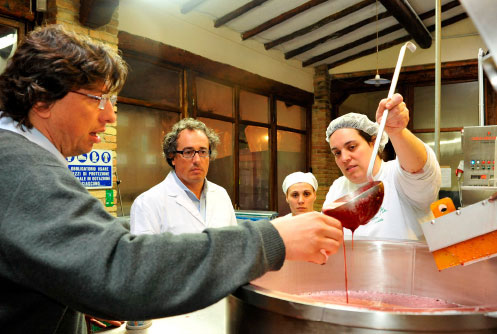 In the photo: La Vialla's kitchen workshop, from the left Gianni, Marco, Merita and Michela during first tasting of OliPhenolia, "fresh" from the pan, fresh also because the two ingredients are combined cold.
In the photo: La Vialla's kitchen workshop, from the left Gianni, Marco, Merita and Michela during first tasting of OliPhenolia, "fresh" from the pan, fresh also because the two ingredients are combined cold.
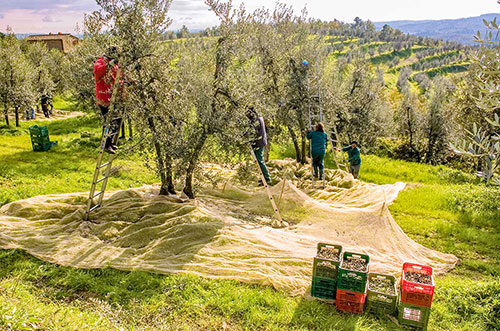 October: picking olives
October: picking olives
The process is simple, a closed cycle, so that the entire olive is used: the extra virgin olive oil, the olive fruit water used to make OliPhenolia and recover the valuable polyphenols, and lastly the pomace, which, after composting slowly with all the Fattoria’s other waste products, returns to the ground to bring new fertility to the soil.
A closer look at what OliPhenolia contains
Despite the use of the sophisticated technology described previously, OliPhenolia is a completely natural and seasonal product that cannot be reproduced “synthetically” in a laboratory. The specific contents of each single jar can vary in quality and quantity from year to year, from season to season. It’s precisely the natural mixture of different polyphenols that gives it unique properties, which don’t strictly depend on the concentration of the individual components. Every single pack of OliPhenolia contains information on the results of the analyses carried out, illustrating the polyphenol content.
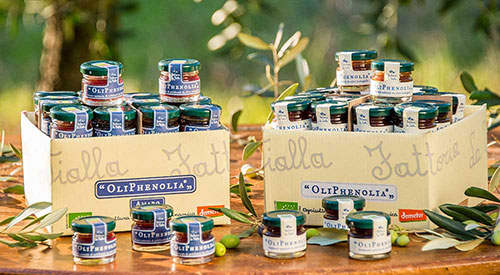
But, in any case, let’s take a more in-depth look...
A little jar of OliPhenolia contains, on average, over 30 mg of hydroxytyrosol, one of the most studied polyphenols, which, in nature, is only found in olive fruit water, olive leaves and olive oil (in lesser quantities). It also contains verbascoside, tyrosol, chlorogenic acid, 3,4-DHPEA-EDA and other polyphenols that haven’t yet been identified, for a total of approximately 250 mg of polyphenols. To make a comparison, 250 mg (the average amount contained in a jar) is the quantity of polyphenols found in roughly 300 g of freshly picked olives. The concentration of polyphenols in a good extra virgin olive oil is approximately 250 mg per litre, while in OliPhenolia, on average, it’s over 9,000 mg per litre; this means that a single 25 ml jar of OliPhenolia contains more polyphenols than 1 litre of extra virgin olive oil!
OliPhenolia – 100% natural, organic and biodynamic dietary supplement – is a “unicum” that cannot be reproduced chemically, a phytocomplex created by nature in which all the components interact and synergically exert an action that is greater than their sum, as biodynamics also teaches us.
Biodynamic cosmetics - Skin and haircare products made with OliPhenolia
The use of olive oil as an organic cosmetic (before the term even existed), dates back to time immemorial. The use of olive oil for personal care and hygiene was rooted in the culture of all the ancient Mediterranean peoples, from the Greeks to the Romans; it was used as an anti-inflammatory ointment, a moisturiser, an anti-oxidant, regenerating remedy and a beauty oil.
Olive fruit water, on the contrary, is still relatively unknown even though particularly interesting for the production of organic cosmetics, because it consists of water and stable compounds that are well suited to similar products.
La Vialla’s cosmetics with OliPhenolia are unique because they are made with over 60% of certified biodynamic (Demeter) ingredients, the olives. Both their oleic and water-soluble phenolic components are used, in addition to the valuable fatty acids, tocopherols and vitamin E contained in the extra virgin olive oil. The rest is liquid obtained by filtering the olives’ fruit water, and a small percentage of other ingredients of plant origin. And it comes from a closed production cycle that is good for both the health of our skin and, at the same time, the preservation of our planet. In the dynamics of global advertising, the public’s attention is artfully centred on the active ingredients contained in the various creams – usually very small percentages of the total content – hiding in the background the actual composition of the rest of the product, which makes widespread use of petroleum derivatives (petrolatum jelly and oil, parabens, silicone, paraffin, etc.) ingredients of animal origin, even from industrial livestock farming. This is why, today, part of the scientific world and – finally – of public opinion, believes that certain types of cosmetics are unhealthy and unsustainable.
In 2015 La Vialla began to work with RSC Pharma, in Giessen, an important German pharmaceutical laboratory, partner and executive director of which is Prof. Thomas Schmidts, a client of the Fattoria. Motivated by the research and growing number of articles published on the polyphenols contained in olive mill wastewater, he managed to convince the Viallini (initially very hesitant: for them it was a field that had nothing to do with all the Fattoria’s other work) to undertake a series of studies in order to use the properties of OliPhenolia on skin in the form of totally organic, Demeter certified and natural cosmetic products meeting the most stringent biodynamic criteria.
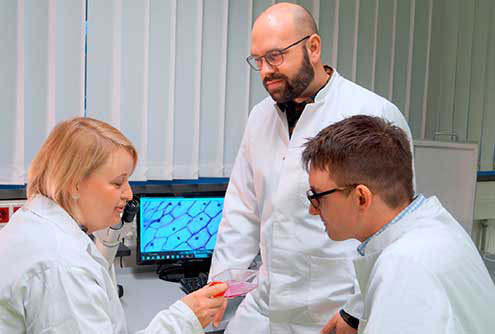 Prof. Thomas Schmidts, in the centre, with colleagues Dr Peggy Schlupp and engineer Sören Wildenhain
Prof. Thomas Schmidts, in the centre, with colleagues Dr Peggy Schlupp and engineer Sören Wildenhain
The results were not long in coming: after various research and experiments (the results of these studies were published in the scientific journal “Cosmetics” www.mdpi.com) La Vialla surrendered ….after all the skin, the largest organ of our body, needs good “nourishment” – its health bears witness to the wellbeing of the entire body.